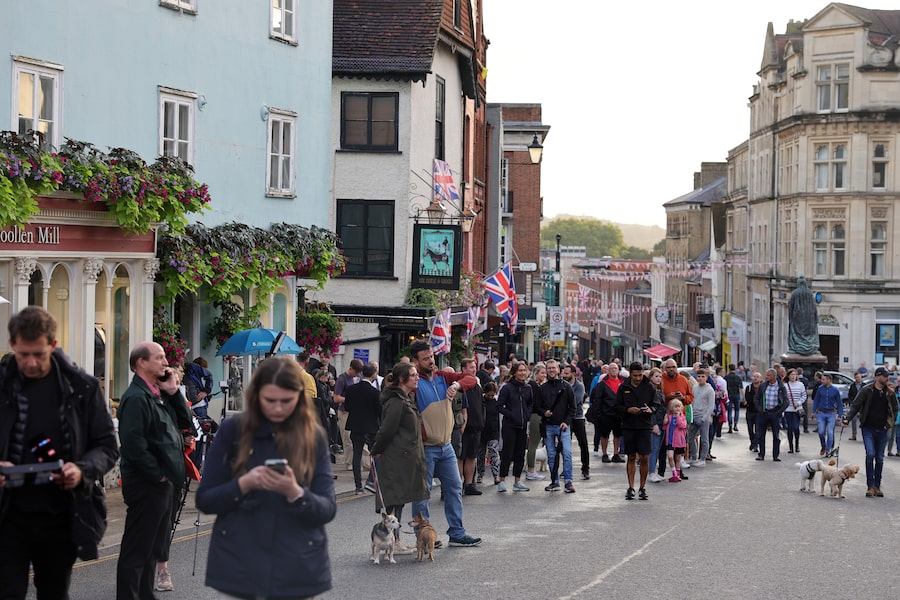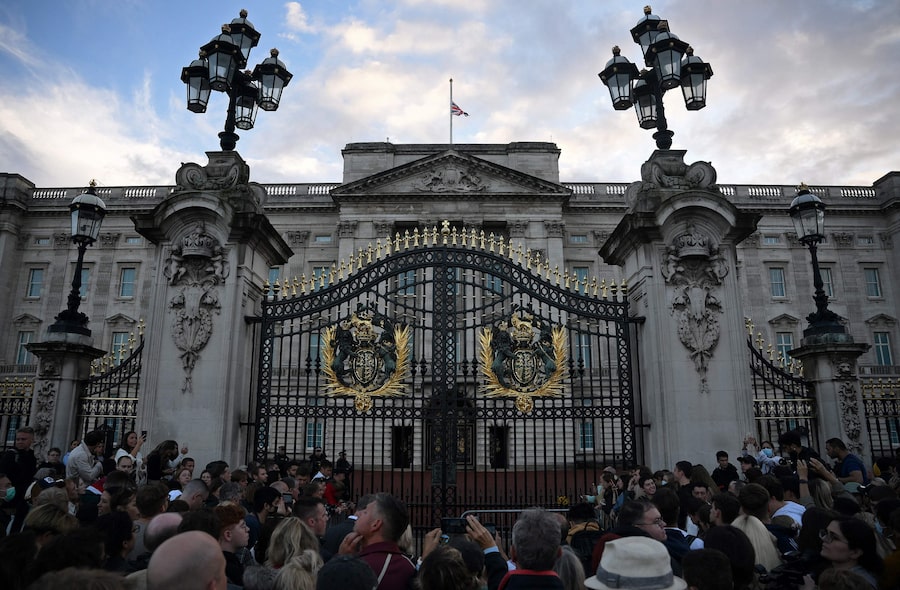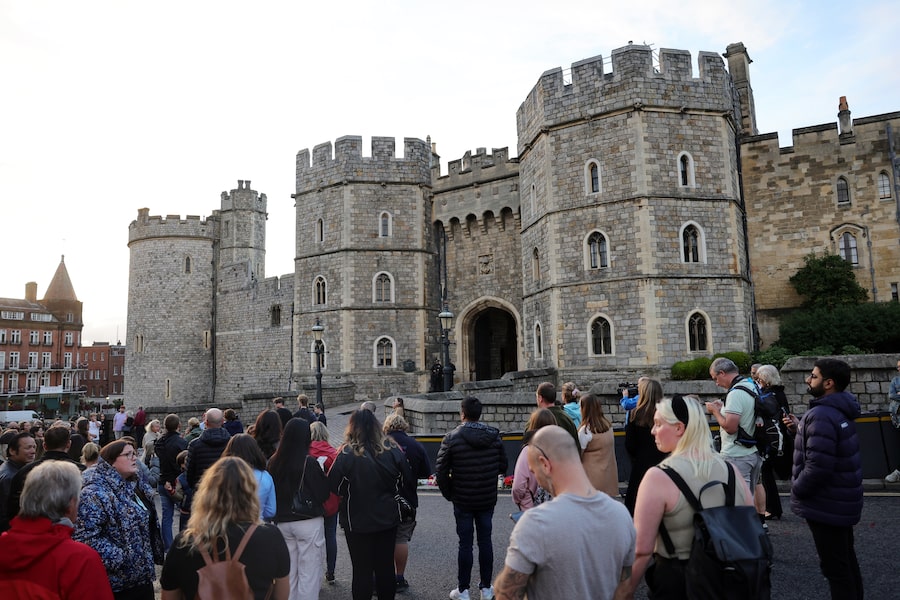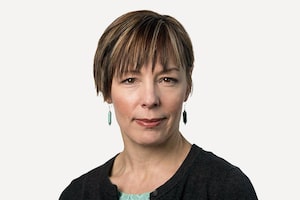
A portrait of Queen Elizabeth is draped with a black ribbon amongst books of condolences for the public to sign, in Queen's Park Legislative Assembly of Ontario, on Sept. 9 in Toronto.Cole Burston/Getty Images North America
In British Columbia’s capital, visitors to the legislature queued up to sign a book of condolences, set out under a portrait of the Queen with its frame draped in a black shroud. Flags are at half-mast, and the exterior of the parliamentary buildings are lit in royal blue.
Across the country, each province in this Commonwealth country is following its own set of protocols for the official period of mourning for Queen Elizabeth, who died Thursday at 96.
For B.C., there is the public face of the province’s official mourning period. The other side of protocol is what is not being done: Politicking is largely suspended. Premier John Horgan and Prime Minister Justin Trudeau met in Vancouver on Friday as planned, but there were no public appearances or media availability. A joint news conference to announce an expansion of daycare subsidies was postponed.
Queen Elizabeth II, the monarch of modernity, is gone
Queen Elizabeth, who reigned longer than any other British monarch, dies at 96
At Queen’s Park in Ontario on Thursday, Government House Leader Paul Calandra tearfully adjourned the House’s summer session until Wednesday afternoon, when members will meet to pay tribute to the Queen’s “incomparable legacy.”
Earlier in the day, two government bills received royal assent, which Lieutenant-Governor Elizabeth Dowdeswell said she believed were the last pieces of legislation to be passed in the Queen’s name across the Commonwealth.
“I found out from one of my staff who had just seen the notice from the palace,” Ms. Dowdeswell told media Thursday on how she was informed of the Queen’s death. “It was literally just as we were concluding that I got word.”
In Quebec, a provincial election is set for Oct. 3 and the campaign continued unabated on Friday. Coalition Avenir Québec Leader François Legault promised a $20-million boost to food-bank infrastructure if his government is re-elected.
On Thursday, sovereigntist Parti Québécois Leader Paul St-Pierre Plamondon criticized Mr. Legault’s decision to fly the Quebec flag at half-mast on government buildings. “While I offer my condolences to the family,” Mr. Plamondon wrote on Twitter, “I’m against the Quebec nation putting its flag at half-mast. F. Legault should not treat the Queen of England as Quebec’s head of state, nor give credibility to a colonial regime that’s illegitimate in Quebec.”
Opinion: When I met the Queen and Royal Family, I realized they’re just like us, except not
On Friday, Mr. Plamondon said he reacted too quickly and chose the wrong moment to launch his criticism, saying he didn’t mean to offend anyone.
Alberta’s provincial government entered a 10-day “communications blackout” across government, according to an internal memo obtained by The Globe and Mail. The note said Alberta will not hold any news conferences, produce news releases, or make social-media posts during the mourning period.
The province, like other jurisdictions, is still smoothing out details related to the royal transition. Justin Brattinga, a spokesman for Premier Jason Kenney, said there will be a “provincial public memorial” on the last day of mourning. His statement ended with, “God Save the King.”
In Manitoba, the Queen’s Cypher – her monogram – is being projected on the front of the legislature, beneath the Golden Boy statue perched on the dome. The projection will last the duration of the mourning period and is visible after dark. In Memorial Park, opposite the legislature, the fountain is lit purple – a nod to the Queen’s colour designation for her Platinum Jubilee.
Inside the legislature, adjacent to the grand staircase in the main foyer, black ribbons have been placed on the Canadian and Manitoba flags. At the base of the staircase, Manitoba has set up a book of condolences, already signed by the Premier and other dignitaries.
Opinion: Legally speaking, Charles is now the King of Canada
Opinion: A loss of a link to the past and some of the fairy dust of Canada’s constitutional monarchy
The government said memorial services, public books of condolences, military gun salutes and proclamation ceremonies are being planned through the period of mourning, but details are not yet available.
Like other jurisdictions, flags on Manitoba’s government buildings will be set at half-mast for 10 days, or until the Queen’s commemorative service.
The Saskatchewan government “is limiting celebratory events, announcements, and social media activities in the two days following Her late Majesty’s death, and during the national day of mourning,” which will be announced by Ottawa, provincial government spokesperson Diane Robinson said.
In a written statement, Jason Quilliam, Saskatchewan’s Chief of Protocol, explained that the protocols are “informed by traditions that are historical in nature, but also updated to reflect current norms. … Each province will take local context into consideration when making plans, but the collaboration between the provinces and the federal government means that many of the steps being taken will be similar across the country.”
Tours of the legislative buildings in Newfoundland and Labrador and Nova Scotia have been cancelled until further notice. A “resolution of sympathy” will be offered in Prince Edward Island when the legislature resumes, currently scheduled for November. New Brunswick will be holding a provincial memorial service and an Accession proclamation ceremony for King Charles, with details not yet confirmed.
Not all political activity in B.C. is on hiatus. On Saturday, a byelection for the provincial riding of Surrey South will proceed. Lindsay Coté, executive director of the Liberal Party – B.C.’s official opposition – said the campaign will carry on. “It’s incredibly awkward, we need to be respectful, but there is a byelection, and there is going to be a result.”
With a report from Eric Andrew-Gee in Montreal







 Justine Hunter
Justine Hunter Carrie Tait
Carrie Tait Dustin Cook
Dustin Cook